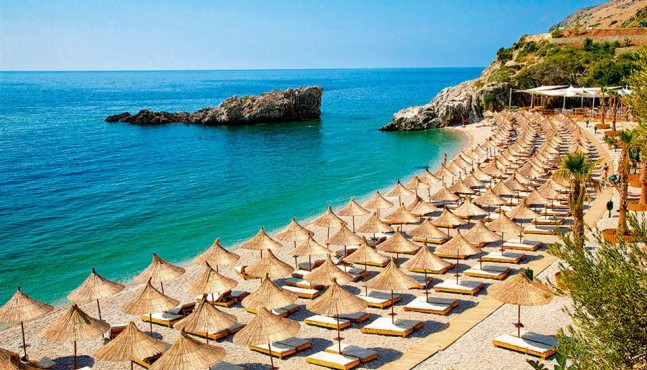Speaks Zak Topuzi, Albanian Tourism Association
Greece, which is seeing the opening as the only salvation, has 300m euros available as grants for the tourism sector at the start of the season. Montenegro and Macedonia, on the other hand, have kept the policy of subsidizing and supporting operators unchanged.
Zak Topuz, from the Albanian Tourism Association, estimates that in these conditions, our country is in an unequal position of competition, as support for the sector from the government has been minimal. He estimates that an opening of Greece can change the panorama of tourism in our country, where the one who is considered an elite tourist can choose the neighboring country.
How do you see the tourism sector this year, given that the first charters with tourism organized by Ukraine, Belarus have started to arrive. Is there a positive expectation for other groups like Belarusians, Russians, Czechs and Poles?
Despite the optimism that has gripped Europe, opening up will not be easy this season either. Attempts are being made to open up almost the entire EU, but there are problems. Vaccination has been slow while there have also been skeptics who have been reluctant to do so due to the effects. At the moment we are talking, not even 25 percent of the population has been vaccinated. Without a general vaccination, there will hardly be a season with normal movement.
To us, indeed the first charter with tourists from Belarus has decreased, but I think it was an advertisement for elections. The situation is different. Regardless of the reservations, they are all “free cancellation”, ie the main booking engines for reasons of uncertainty, apply reservations without obligation and allow cancellations on the last day (24 hours in advance).
For Albania, Ukraine and Belarus have given the first signs. Russia is expected to arrive in June, but that depends on a political decision by the Russian government. Serbia and Montenegro have shown signs of interest in our coast. The Poles are expected to arrive by mid-June. The tourist from the EU and Germany I believe will come from September. This year’s tourism will be almost like last year, including the Albanian-speaking area and the Balkans. These are the first signs.
There was some sort of initiative to vaccinate tourism sector workers by the government. How do you think this part affects the sector?
It is an important process for the market. Almost all of Europe is trying to vaccinate groups that are related to tourism, as well as islands that are important for tourism and designated destinations. Despite being positive, I think we are late.
Let’s not forget that vaccines like Astra Zeneca require you to take the second dose after a month. Then they need two weeks to ensure consistency. With these deadlines, we go to mid-July to complete it as a process. Vaccination of accommodation units and operators in the coastal area has started, but we are not in the final stage to say that the vaccination has progressed.
Hopefully the vaccination will create a conviction, especially for seniors who are more skeptical and most affected by the pandemic. On the other hand, let’s hope that this season starts in June through September, to be again with the same indicators as 2020 tourism.
Has the pandemic affected the emergence of some trends in the tourism sector related to expenses, destinations frequented, for the groups with which it travels, ie individually or in groups? What do you notice?
It is generally the same trend. Movement with a few days, movement with their vehicles, beach, mountain, sea all kinds of tourism and mainly in the nearby areas. Before 2020, it started with a trend related to low-cost tourism where some of the important cities of Europe declared war on free tourism. Such were Barcelona, Dubrovnik, Vienna which tried to remove the “low cost” lines and get more quality tourists. According to them, the expansion of tourism is causing damage to these areas and problems with permanent residents.
In the wake of this, experts have given the signal that people are looking for a more space tourism, with limited distances for vehicle movements, to be closer to the greenery and this will be the tourism trend in the coming years. To summarize, we expect the movement to be in the Balkans again this year, as all European countries are trying by all means to keep their population within the territory, in order to spend as much currency as possible within the country.
How do you see Albania in the competition with regional competitors, but also with Turkey, which has been a destination frequented by the all-Albanian part. How are we in relation to competitors like Montenegro, Greece, which still remains unclear whether it will open or not?
If we look at the current situation, there are three main competitors in Europe, who are trying and insisting on an immediate opening. They are Greece, Spain and Italy that are not taking into account the observance of one of the long-dictated proposals in the EU, for the creation of a certificate or a vaccination passport. Greece is our main competitor that is trying to open up now. The week when Greece opens will be the most important to see what will happen to tourism in our country this year.
If Greece keeps its promises that the opening will be unconditional for other Western Balkan countries, Russia and China, and not just for those who have a vaccination passport, there will be a lot of competition. Greece has also given signals for opening with Serbia which is a very important contingent for the current situation.
For Albania, if the border with Greece is opened, it will be a loss, as we hope that the main contingent of tourism will be Kosovo, Northern Macedonia and Montenegro with the Albanian-speaking part. Opening the border with Greece means that a significant portion of elite tourism will pass through there and use Greece as a springboard. This will have a huge impact. We are talking about an Albania that on average provides, according to a recent study, almost 390 USD per tourist, while Kosovo has twice the income per tourist.
There is a tourist with potential, as there is the diaspora which pays and spends 2.5 times more per tourist. To tell the truth, Greece is in a moment of extraordinary crisis. There was only 23 percent of the number of tourists in 2019, last year, which means that 26 million tourists are missing from a country with 11 million inhabitants.
It’s a very big fight for survival. Greece has prepared a plan to provide a tourism fund of almost 300m euros which will be grants to launch the tourist season. We are in an unequal situation, where the region is thinking broadly. Macedonia and Montenegro also continue to subsidize tourism and its employees. I think the situation of our tourism will depend a lot on the events that will happen in the last two weeks.
Since we are in the support that the region is giving to the sector. How much has the tourism sector been supported by the government?
Albania has hardly helped the tourism industry at all, with the exception of the $ 4 million it provided in the first phase. All other promises have been minimal. Even the main request, the reduction of the building tax, was not realized even by the Municipality of Tirana.
Although there was a 30 percent reduction, fines were imposed for not being able to pay, which made the tax go to the same level. The region has made tremendous moves. Has reduced VAT on all hotel services, but also in bars and restaurants. Northern Macedonia has made it 7 percent; Montenegro, 7 percent; Kosovo 8 percent.
Albania has remained in its old indicators. So VAT for bars and restaurants is 20 percent. Turkey raised 1 per cent of hotel VAT to save this important industry from bankruptcy. We are in open competition with the region which, to tell the truth, has been able to provide a great help to this industry.
Albania, simply because it has kept bars and restaurants open and has not closed its borders, except for certain moments, has managed to enable the survival in minimal conditions of a small part of the industry. Most of the accommodation sector consists of small hotels and apartments, which are managed individually by family members and this has somehow saved this industry from total bankruptcy.






